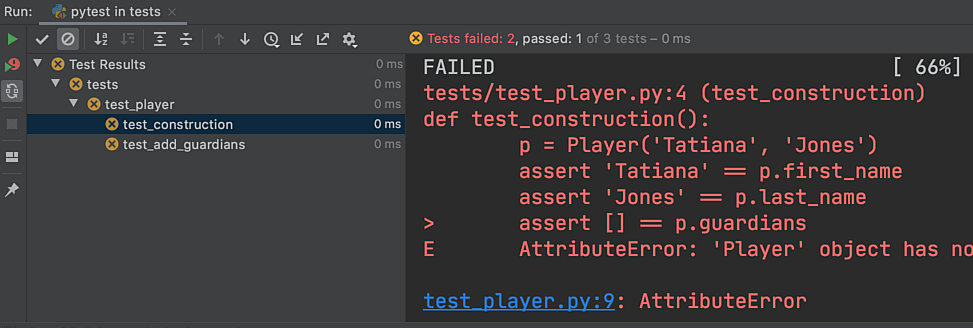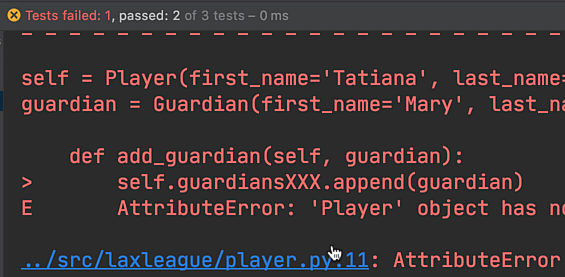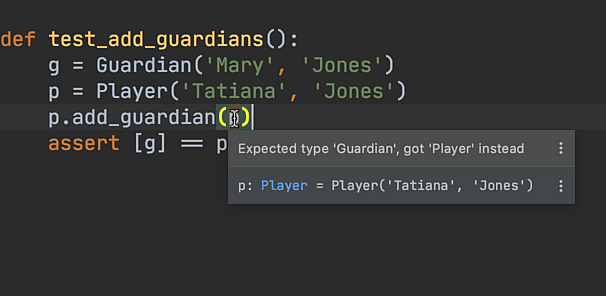Jump to Error
Writing code means writing broken code. Click a link in a traceback to open a file on the line of the error.
Since we have Guardian now, let's hook it up to allow adding a Guardian to a Player.
In this step we'll implement this while showing how visual testing can speed you up when you make a mistake. First: some housekeeping on our code.
Let's Do A dataclass
Python 3.7 shipped with a neat feature called dataclasses, available with a backport package to 3.6. Let's start by simplifying our two classes with dataclasses and showing a side benefit in test writing.
First, the Guardian we were just working on in guardian.py:
from dataclasses import dataclass
@dataclass
class Guardian:
""" A guardian or parent in the league """
first_name: str
last_name: str
When writing this dataclass, note how PyCharm helps:
-
Autocomplete and import the
dataclassdecorator -
Autocomplete on str
Our refactoring into a dataclass went well. How do we know? Because our tests pass. In fact, we didn't have to remember to run our tests, because we setup PyCharm to autorun the tests. In double fact, we didn't even have to save the file. Yummy.
Now we change our Player class:
from dataclasses import dataclass
@dataclass
class Player:
""" A lacrosse player in the league """
first_name: str
last_name: str
Our test_player test fails.
We also need to update the construction test in test_player.py:
from laxleague.player import Player
def test_construction():
p = Player('Tatiana', 'Jones')
assert 'Tatiana' == p.first_name
assert 'Jones' == p.last_name
Now let's get some extra benefit from dataclasses and type annotations.
In the test, try passing in Player('Tatiana', b'Jones'), with a byte-string by accident.
The dataclass only allows str as values for last_name and PyCharm very visually makes this clear, just as you type it.

Verdict: TDD + (IDE + type hinting) == "fail faster."
On to associating a Guardian with a Player.
Player with Guardians
We'll follow TDD by writing a failing test first, then doing the implementation. This time, though, we'll make a typo, to show a feature of using PyCharm's visual testing.
Let's start with a test in test_player.py:
from laxleague.guardian import Guardian
from laxleague.player import Player
def test_construction():
p = Player('Tatiana', 'Jones')
assert 'Tatiana' == p.first_name
assert 'Jones' == p.last_name
assert [] == p.guardians
def test_add_guardian():
g = Guardian('Mary', 'Jones')
p = Player('Tatiana', 'Jones')
p.add_guardian(g)
assert [g] == p.guardians
We first need to ensure, in test_construction, that we have an empty list for player.guardians.
Then, in the new test test_add_guardian, we make both a player and a guardian, add the guardian to the player, and test the result.
This means we also import Guardian in this test.
Both tests fail:
-
We don't yet have
guardiansas a field on ourPlayerdataclass -
We don't have a method
add_guardians.

Let's fix this by implementing the feature in player.py:
from dataclasses import dataclass, field
@dataclass
class Player:
""" A lacrosse player in the league """
first_name: str
last_name: str
guardians: list = field(default_factory=list)
def add_guardian(self, guardian):
self.guardians.append(guardian)
This dataclass adds a new dataclass field named guardians.
It is a little different: as Python's mutable default values docs explain, Python class attributes can't default to a list. Python
dataclasses fix this with a dataclass field function which can assign a factory to construct the default value.
We used the type list in this case. We'll explain more in a moment.
Our new field and the simple add_guardian method does the trick: now our tests pass.
Pretend for a moment that we made a typo. Do the following:
-
Change the last line of
players.pytoself.guardiansxxx.append(guardian) -
Open
guardian.pyin that tab -
Watch the tests fail with a traceback
-
Click on the error link for
player.py:12: AttributeError -
PyCharm re-opens the file, on the line of the error
-
Remove the
xxx

When writing code under testing, you will constantly make mistakes and generate exceptions. PyCharm's handy exception links let you jump right to the error.
The Benefit of Type Hints When Writing Tests
Type hints generate a lot of pushback in the world of Python. But when paired with an IDE like PyCharm, they help you "fail faster."
What does "fail faster" mean?
-
You could do nothing and let your mistake surface in production
-
Or, write tests and "fail" when your tests run...if you have tests for that code
-
Or, write type hints and run a type checker like
mypyperiodically -
Or, have your IDE flag your type-related mistake in real-time, while you are watching it
-
Or, have your IDE prompt, via autocomplete, what is valid before you type it
-
All of this, in TDD, as you are a consumer of your own code
Let's see it in action. Our Player dataclass says that guardians is a list, but a list of what?
Currently you could assign anything you want to it.
Instead, in the Player dataclass, let's signify that it is a list of Guardian instances:
guardians: List[Guardian] = field(default_factory=list)
Note
As you type List, use ⌃␣ (macOS) / Ctrl+Space (Windows/Linux) to complete it, which also generates the import. Same for Guardian.
What is typing.List and why can't we use list?
It is a "generic", which lets it further specify the types of things it contains.
list saves an import but doesn't allow us to say "list of Guardians".
Next, let's indicate that add_guardian can only take a Guardian instance:
def add_guardian(self, guardian: Guardian):
self.guardians.append(guardian)
To see how this helps us "fail faster", imagine tried to add a Player as a Guardian. Our IDE warns us with a perfect message:

In this latter case, the code would have stored the string. Type annotations, combined with the immediate feedback in the IDE, helped us "fail faster", as we type.
Here is our final version of player.py:
from dataclasses import dataclass, field
from typing import List
from laxleague.guardian import Guardian
@dataclass
class Player:
""" A lacrosse player in the league """
first_name: str
last_name: str
guardians: List[Guardian] = field(default_factory=list)
def add_guardian(self, guardian: Guardian):
self.guardians.append(guardian)
